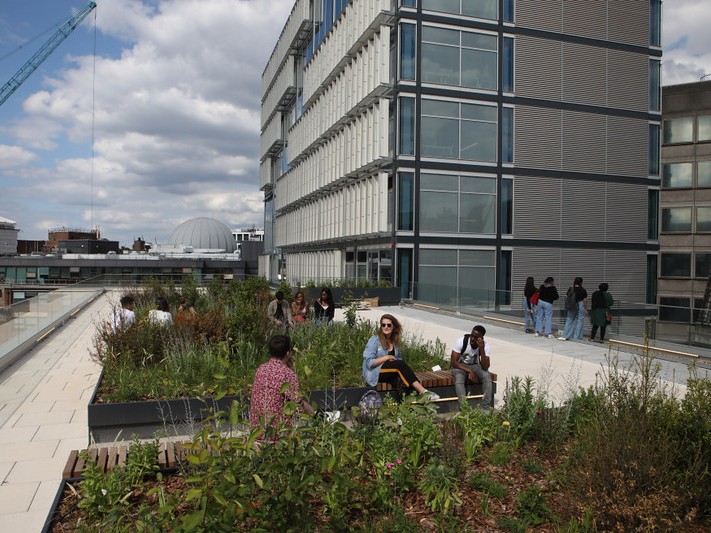 LSE's Centre Building was built with sustainability at its core
LSE's Centre Building was built with sustainability at its core
LSE has today (21 October) launched its plan to tackle the climate crisis and announced it will be the first UK university to become carbon neutral, for all the emissions it currently measures.
This status will be achieved through ongoing work by the School to reduce its carbon footprint and by offsetting residual emissions through the funding of carbon reduction projects elsewhere. Currently, LSE measures emissions associated with the School’s energy use, water consumption, waste generation and business travel.
The leading social science institution has already significantly reduced its carbon footprint through investment in energy efficiency and other measures. These include sourcing 100% of the School’s electricity from renewable sources and retrofitting buildings to optimise energy use.
LSE will continue to work - as a priority - to achieve its longer-term commitment of becoming net-zero. This will involve the School following a challenging carbon reduction pathway in line with climate science and using carbon removal measures for all its residual emissions.
This is one of a package of commitments set out by the university today in a bid to tackle the climate crisis and embed sustainable practices across all areas of the School - from education and research to investment and leadership.
The university’s Sustainability Strategic Plan was created in full consultation with the LSE community. Through a series of events and workshops, engagement with Student Union societies and an online survey, LSE students and staff made clear their desire for the university to take bold action on the environment.
During the consultation, 95 per cent of LSE staff and students said LSE’s approach to environmental sustainability was important to them and 93 per cent said they would be willing to accept changes to their university life to support sustainability.
In response, the new plan - co-ordinated by an advisory group of staff and students under the leadership of Professor Nicholas Stern - sets out six key areas of focus to maximise LSE’s impact in shaping a more sustainable world.
These areas include education; research; engagement and leadership; investment; operations; and collaboration.
- As a social science institution, LSE is well-placed to embed sustainability into the curriculum and equip students with knowledge and skills to address climate change. This includes promoting and introducing new courses and extra-curricular activities which relate to sustainability and highlighting these clearly to students, for instance by using green tags.
- LSE academics are already world renowned for their research on environmental and social issues and the School will reaffirm this contribution by making sustainability research a key strategic area when seeking funding and philanthropic support. The current momentum towards online research activities will be continued to reduce the carbon impact of research-related travel.
- The university will use its reputation on the world stage to shape global discussions on sustainability and engage with public, private, and non-governmental organisations. A newly appointed Sustainability Board of LSE students and staff led by LSE Director Minouche Shafik will provide leadership on the delivery of the plan.
- The School will make sustainability a key part of investment decisions and strengthen its Socially Responsible Investment policy towards fund managers who embed climate change in their company selection using tools such as the Transition Pathway Initiative.
- In addition to net-zero carbon targets, action will be taken to mitigate the direct carbon emissions the School cannot yet avoid (such as gas and travel) as an interim measure by funding high quality carbon reduction projects in support of the global transition to a low carbon economy.
- LSE will work with the School community and external organisations to promote action on sustainability. For example, the School has recently joined forces with the Ellen MacArthur Foundation to raise awareness of the circular economy. LSE also co-founded and co-chairs the Global Alliance of Universities on Climate (GAUC), which encourages and supports universities around the world to address climate change as a core part of their mission.
The new plan builds on the significant work already being undertaken by LSE towards a more sustainable future. This includes action by the School to reduce its carbon footprint from direct emissions by 38 per cent since 2005. The School has also invested £4.8m since 2015 in retrofitting LSE buildings with energy-efficient measures.
In recognition of this work, LSE has received a First Class Award for over 10 years running in the People and Planet’s University League.
Commenting on the new commitments, Professor Nicholas Stern, Chair of LSE’s Grantham Institute on Climate Change said: “As the world responds to a global pandemic, we cannot forget the climate crisis facing us. Both require urgent action and a truly global response. A sustainable recovery can be both a fast recovery and help lay the foundations for a transformation in economic development. LSE today is making a commitment to action, and we encourage others to engage and lead on this critical agenda: be it organisations, academics, students and citizens of the world.”
LSE Director, Minouche Shafik added: “LSE was founded for the betterment of society, and our commitment to acting responsibly and sustainably is part of who we are. Our new Plan provides a framework for our staff and students to drive meaningful change towards creating a Sustainable LSE.”
LSE’s Students’ Union Environment and Ethics Officer Saskia Straub, who took part in the consultation, added: “LSE’s sustainability consultation opened opportunities to all members of the School, and in particular students, to have their say and influence decision-making. This has set strong foundations for continued collaboration and involvement of the LSE community on this critical agenda. The climate and ecological crisis affect us all and we can only tackle them by working together.”
To hear more about the Sustainability Plan, watch this video from LSE Director Minouche Shafik.